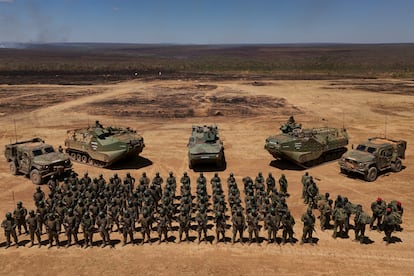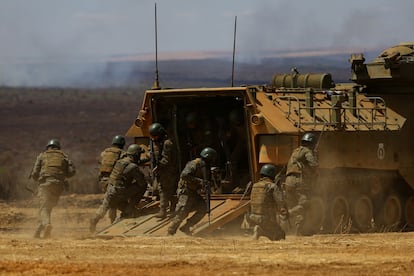US and Chinese soldiers take part in joint military exercises in Brazil
The South American country is hosting troops from the two rival superpowers in what is yet another sign of the country’s ambition to play a bigger role on the global stage


The United States and China may be on hostile terms, but the situation still leaves room for cooperation, even in areas as sensitive as military affairs. Dozens of U.S. and Chinese soldiers, specifically naval infantry, are participating alongside 3,000 Brazilian soldiers in joint military exercises in Formosa, in central Brazil, which are scheduled to end on September 17.
Brazil is a good choice for this meeting as it is a regional power that takes a pragmatic approach to foreign policy — avoiding hostility in favor of dialogue and cooperation — and Beijing and Washington are, respectively, its first and second-biggest trade partners.
Most of the troops taking part in the military exercises — which involve airplanes, tanks, armored vehicles, amphibious vehicles and missile launchers — are from Brazil. The U.S. delegation has 56 soldiers, while the Chinese delegation has 33 riflemen, according to the Brazilian newspaper Folha de S. Paulo. In a sign of Brazil’s historically broad and eclectic alliances, the drills also include uniformed personnel from Mexico, South Africa, Argentina, Italy, Pakistan, the Republic of Congo, France and Nigeria, although in more modest numbers. Last year, China only sent military observers to these exercises, not soldiers, the Brazilian Navy reported.
With such moves, Brazil is emphasizing its traditional stance on foreign policy, which President Luiz Inácio Lula da Silva has expanded with the help of his long-time advisor on international affairs, Celso Amorim. The fact that soldiers from the superpowers are in Brazil is a sign of how the country is seeking to play an important role in global politics. “Brazil wants to be a mediator in the international system, to mediate between the South and the North, and between those antagonistic universes of geopolitics that are Eurasia, led by China and Russia, and the Atlanticist bloc, led by the United States and Europe,” explains Pedro Costa Júnior, an international analyst from the University of São Paulo.
The U.S. Embassy in Brasília welcomed the military exercise in a statement that praised Brazil’s cooperation and their 200-year-long bilateral relations, but did not mention the involvement of troops from China or other countries. “This year’s exercise focuses on training CFN’s [Brazilian Naval Infantry] rapid reaction force, verify expeditionary capabilities, and coordinated fires of all their weapons,” said the statement, adding that Brasília and Washington maintain “a long-standing and multifaceted security cooperation partnership that plays a significant role in promoting regional stability and addressing common security challenges in the Western Hemisphere.”

The military exercises — called Operation Formosa 2024 — are taking place inland, although they are organized by the Navy. They began on September 7 in Rio de Janeiro, when the troops set out on a 870-mile journey to the heart of the country, with the necessary equipment to set up an expeditionary base.
Eduardo Heleno, a professor at the Institute of Strategic Studies at the Fluminense Federal University, points to Brazil’s growing interest in boosting military collaboration with China. The commander of the Brazilian Army, General Tomas Paiva, explained in June, in an interview before a trip to Beijing, that the goal was to increase cooperation from the current academic field (training of officers and cadets), to the defense industry and military science, “an area in which they are advanced,” he told the newspaper Estadão.
The general also revealed that he had instructions from the Lula government to strengthen ties with all the BRICS countries except for Russia, due to the war in Ukraine. In other words, with China, India and South Africa. Heleno suggests that the unprecedented participation of Chinese and U.S. troops in joint military exercises in Brazil is the result of an international naval infantry meeting held in Rio last November, which was attended by both U.S. General David Bello and Major General Zhu Chuansheng, the commander for the China’s marine forces.
The military expert points out that “the irony of fate is that these military exercise are taking place in a training camp called Formosa, like the city where it is located, and the name that Portuguese navigators gave to the island of Taiwan.” The disputed territory of Taiwan, on the other side of the world, is indeed the greatest source of friction between the U.S. and China in modern times.
In 1947, at the height of the Cold War, Brazil was already considered such a key country that the U.N. gave it the honor of opening the round of speeches by heads of state at the annual General Assembly. Following that tradition, Lula will be the first head of state to take the floor for the 79th General Assembly in New York.
In a reflection of Brazil’s diplomatic ambition, Brasília is home to embassies from almost every country on the planet. This week, Celso Amorim — a veteran diplomat and Lula advisor, is visiting Russia for a BRICS summit while Foreign Minister Mauro Vieira is visiting Gulf countries. For weeks, both diplomats have been trying to find a peaceful solution to the political crisis in Venezuela. So far, without success.
Sign up for our weekly newsletter to get more English-language news coverage from EL PAÍS USA Edition
Tu suscripción se está usando en otro dispositivo
¿Quieres añadir otro usuario a tu suscripción?
Si continúas leyendo en este dispositivo, no se podrá leer en el otro.
FlechaTu suscripción se está usando en otro dispositivo y solo puedes acceder a EL PAÍS desde un dispositivo a la vez.
Si quieres compartir tu cuenta, cambia tu suscripción a la modalidad Premium, así podrás añadir otro usuario. Cada uno accederá con su propia cuenta de email, lo que os permitirá personalizar vuestra experiencia en EL PAÍS.
¿Tienes una suscripción de empresa? Accede aquí para contratar más cuentas.
En el caso de no saber quién está usando tu cuenta, te recomendamos cambiar tu contraseña aquí.
Si decides continuar compartiendo tu cuenta, este mensaje se mostrará en tu dispositivo y en el de la otra persona que está usando tu cuenta de forma indefinida, afectando a tu experiencia de lectura. Puedes consultar aquí los términos y condiciones de la suscripción digital.








































